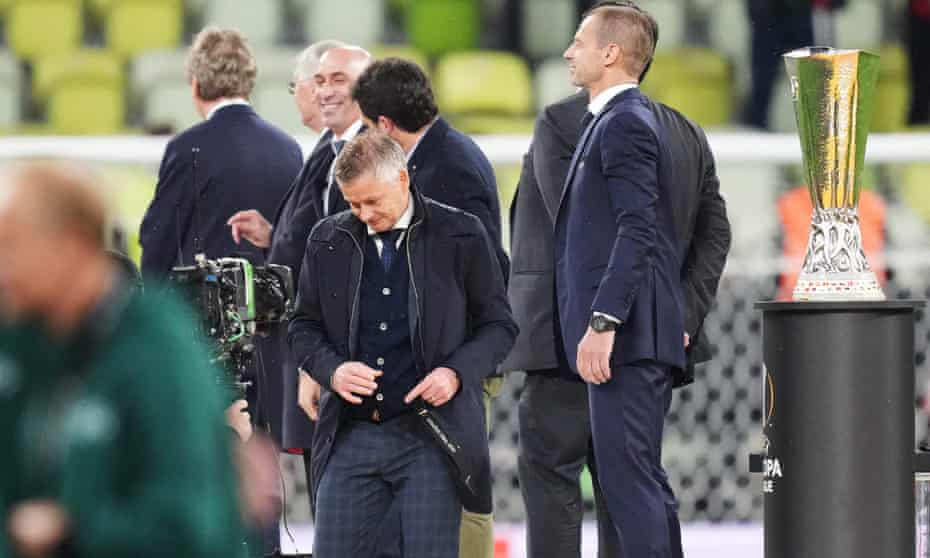What if David de Gea had converted his penalty in the shootout against Villarreal? How much difference would it have made had he scored on Wednesday and Gerónimo Rulli had been the goalkeeper to miss from the spot? Was that really it, that one kick, 4.5% of a penalty shootout, was that all that determined whether this season could be considered a success or not for Manchester United? How absurd it should all come down to the capacity of one goalkeeper to beat another.
Even at the best of times, De Gea has the air of a doomed llama. Having extended his run of penalties conceded in a row to 36 over a six-year period (does Bruno Fernandes, who has scored 32 of his past 33 for United and Sporting, not including shootouts, practise against him? If he does, is there a more futile contest taking place on any training ground?), there was a glum inevitability as he stepped up.
As such he makes an easy scapegoat – and it is reasonable to ask why, with one substitution left to make, Ole Gunnar Solskjær did not replace him with Dean Henderson, who has saved eight of the 19 penalties he’s faced – but this was about far deeper-rooted problems. Perhaps to link Solskjær’s inaction to his failure to substitute Fred before he was sent off against Paris Saint-Germain in December is unfair, but they are two instances when decisiveness may have headed off setbacks that felt extremely predictable.
Of course it matters that United extended their trophy drought to four years. Of course it matters that Solskjær does not have silverware to foster the sense he is building something. But what matters far more was the nature of the defeat. United again and again under Solskjær have struggled against well-organised opponents who sit deep.
Come at United, leave space behind your defensive line, and they will expose you. On the counterattack, they can be devastating, as Manchester City have found repeatedly, as PSG have twice discovered in losing to them at the Parc des Princes, as RB Leipzig learned at Old Trafford. It’s part of the reason United’s away record is so much more impressive than their home record this season. But bed in with a low block and they are reliant on one of their brilliant players doing something brilliant; there is little sense of cohesive attacking structure – something that marks out the very best from the rest.
“When Ole came in we had a process,” a defiant Marcus Rashford said. “We believe in the process.” His loyalty is commendable but that process is as hard to discern now as it was when Solskjær got the job two and a half seasons ago. His advocates will point out that United improved their league position by a place and gathered eight more points this season than last, but is that really to do with underlying improvements or is it simply that now they have Edinson Cavani?

It was his alertness and intelligence that brought the equaliser on Wednesday – a poacher seizing on a loose ball from a corner to awaken memories of another European final on Matt Busby’s birthday. But echoes of past glories are not enough and the more immediate comparison was of the defeat by Sevilla in the Europa League semi-final last season.
Then, too, United toiled against disciplined but unspectacular Spanish opposition. Then, too, they ran out of belief. And then, too, Solskjær delayed his substitutions. Nothing has changed.
Against Sevilla, he brought nobody on until the 87th minute; on Wednesday he waited even longer, until the 10th minute of extra time, before introducing Fred for Mason Greenwood. How can it be that a squad on which a net £380m has been spent over the past five years leave a manager so apparently short of options? That, perhaps, is some mitigation for Solskjær, but just because one part of the club is failing does not mean that others are not as well.
The biggest problem on the bench is that of Donny van de Beek. Nothing perhaps exemplifies the great carelessness of modern football than the break-up of the Ajax side that reached a Champions League semi-final in 2019. Van de Beek, Frenkie de Jong, Matthijs De Ligt and Hakim Ziyech were sold off for £220m; all look poorer players now than they did then in a structure that suited them.
That is why systems matter and United seem not to have one. What happens now? Perhaps United spend another £100m, perhaps they pay a huge fee and land Harry Kane or Jadon Sancho. Perhaps their excellence would mean a handful more points: perhaps United do not suffer the frustration they did against Crystal Palace, Sheffield United or West Bromthis season. Maybe 74 points becomes 78 or 79. There may even be success in one of the cups.
Sign up to The Recap, our weekly email of editors’ picks.
But until there is a cohesive attacking pattern that allows United to dismantle low blocks without relying on Cavani or Fernandes or Paul Pogba doing something sensational, there cannot be consistent success; however much they spend, United will always be a level below the elite.
That’s why De Gea’s miss was little more than a detail. It was the ultimate trigger of failure, of another blank year, but it’s the underlying problems United need to worry about and those would not have gone away even if he had scored.
from Football | The Guardian https://ift.tt/3yJoeEo
via IFTTT

No Comment